|
|
|
Sort Order |
|
|
|
Items / Page
|
|
|
|
|
|
|
| Srl | Item |
| 1 |
ID:
043558
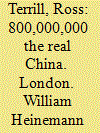

|
|
|
|
|
| Publication |
London, William Heinemann Ltd., 1971.
|
| Description |
vii, 235p.Hbk
|
|
|
|
|
|
|
|
|
|
|
|
Copies: C:1/I:0,R:0,Q:0
Circulation
| Accession# | Call# | Current Location | Status | Policy | Location |
| 010080 | 915.1/TER 010080 | Main | On Shelf | General | |
|
|
|
|
| 2 |
ID:
092415
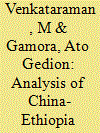

|
|
|
|
|
| Publication |
2009.
|
| Summary/Abstract |
This article analyses the bilateral relations between China and Ethiopia during the Cold War period and brings out the interplay of domestic, regional and extra-regional factors that went into the shaping of bilateral relations. China's growing involvement and various attempts at consolidation of political and economic relationship with African countries-a relatively recent phenomenon-is perceived as a result of the dynamic interplay of economic and political factors. As with other African countries, China's interaction with Ethiopia in the post-Cold War period is markedly different from pre-1990 years. This article investigates the political/economic factors underlying this shift. It describes and analyses the factors that led to China's political and economic ties with Ethiopia (and Africa) during the years of Mao and Deng Xiaoping. It concludes that motivated by the desire to realise its priorities and goals, China's venture into Africa and Ethiopia was shaped by the shift in relations between the United States (US) and China and the Cold War dynamics in the Horn that prevented any kind of consolidation of relations with Ethiopia on the one hand and regime change in Ethiopia on the other.
|
|
|
|
|
|
|
|
|
|
|
|
|
|
|
|
| 3 |
ID:
152967
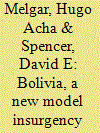

|
|
|
|
|
| Summary/Abstract |
In Bolivia, a brilliantly executed insurgency was carried out between 1995 and 2005, so much so that few perceived it as such. Its most important characteristic was its correct evaluation of the relative correlation of forces and application of the right combination of all forms of struggle. This was possible because of its pragmatism. Though not bound by ideological dogmatism, it nonetheless displayed a deep understanding of insurgency and revolutionary theory. This allowed adaptation and evolution in a changing context. The main form of struggle was not military violence, although it was not absent, but rather violent social protest funded by drug trafficking proceeds. The strategy thus neutralized traditional counterinsurgency models, because it made it difficult to apply coercive force as the enemy was not clearly identifiable. Its success in Bolivia means that the emergence of a new model of insurgency, one still built upon the popular mobilization of people’s war but more attuned to new global realities, is a reality.
|
|
|
|
|
|
|
|
|
|
|
|
|
|
|
|
| 4 |
ID:
085590


|
|
|
|
|
| Publication |
2008.
|
| Summary/Abstract |
Mao's confidence in military confrontations with more powerful adversaries continues to inspire Chinese strategists more than half a century later. This article explores the origins and development of Mao's thinking in this regard, focusing particularly on his years in Yan'an. Drawing on newly available sources, the analysis stresses the importance of experience, as opposed to ideology, in the development of Mao's martial confidence. For much of his time in Yan'an Mao was relatively circumspect in his military ambitions. Yet towards the end of this period his confidence rose considerably after successes against the KMT offensive in 1946. In short, Mao's martial confidence did not spring fully formed from his ideological convictions but emerged over time.
|
|
|
|
|
|
|
|
|
|
|
|
|
|
|
|
| 5 |
ID:
100877
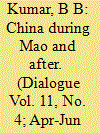

|
|
|
| 6 |
ID:
115498
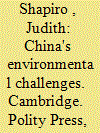

|
|
|
|
|
| Publication |
Cambridge, Polity Press, 2012.
|
| Description |
xxii,205p.
|
| Standard Number |
9780754660905
|
|
|
|
|
|
|
|
|
|
|
|
Copies: C:1/I:0,R:0,Q:0
Circulation
| Accession# | Call# | Current Location | Status | Policy | Location |
| 056864 | 363.700951/SHA 056864 | Main | On Shelf | General | |
|
|
|
|
| 7 |
ID:
184892


|
|
|
| 8 |
ID:
093840
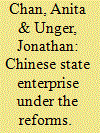

|
|
|
| 9 |
ID:
128481
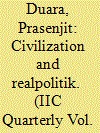

|
|
|
| 10 |
ID:
145248
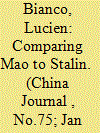

|
|
|
|
|
| Summary/Abstract |
The Greek historian Plutarch famously compared over 40 illustrious Greek and Roman men. This article merely compares two tyrants—Stalin and Mao. Whereas Alexander and Caesar, or Demosthenes and Cicero, lived centuries apart, Stalin and Mao were contemporaries. Rather than recalling their uneasy relationship, this study evaluates and compares three aspects of their performance and misdeeds. As Stalin and Mao were responsible for the deaths of more of their own people than the average tyrant, the study first compares their cruelty and argues that Mao was much less cruel and, second, much less efficient and prone to pursue mutually contradictory aims. Third, he proved more faithful to revolutionary ideals. Two periods during their rule, the Great Terror (1937–38) and the Cultural Revolution, are recalled in order to illustrate the points under discussion.
|
|
|
|
|
|
|
|
|
|
|
|
|
|
|
|
| 11 |
ID:
113928
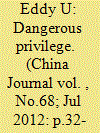

|
|
|
|
|
| Publication |
2012.
|
| Summary/Abstract |
Why did otherwise savvy or cautious intellectuals put themselves at risk by attacking the dictatorial Chinese Communist state during the Rectification Campaign of 1957? This essay highlights the critical impact of the postrevolution institution of the united front. A primary tool for acquiring support of non-Party personnel, the official institution featured at the élite level a bundle of exclusive privilege and cultivated exemplary cooperation as well as sentiments of trust, confidence and even admiration toward the regime. Determined to conduct a successful rectification campaign, the regime targeted the élites as usual for support but with augmented privilege. The particular yet familiar approach greatly affected the psychology and calculus of the élites, prompting some to cooperate in criticizing the state. Their publicized opinions set off the dissent of intellectuals and resulted in their own decline. The analysis furthers understanding of the united front and state-society relations in the early Mao years.
|
|
|
|
|
|
|
|
|
|
|
|
|
|
|
|
| 12 |
ID:
157425
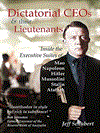

|
|
|
|
|
| Publication |
Australia, Ocean Publishing, 2006.
|
| Description |
320p.pbk
|
| Standard Number |
1920783652
|
|
|
|
|
|
|
|
|
|
|
|
Copies: C:1/I:0,R:0,Q:0
Circulation
| Accession# | Call# | Current Location | Status | Policy | Location |
| 059306 | 923/SCH 059306 | Main | On Shelf | General | |
|
|
|
|
| 13 |
ID:
092348
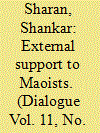

|
|
|
| 14 |
ID:
092688
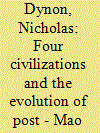

|
|
|
| 15 |
ID:
167971
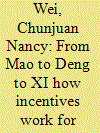

|
|
|
| 16 |
ID:
106922
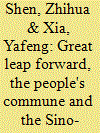

|
|
|
|
|
| Publication |
2011.
|
| Summary/Abstract |
Utilizing recently available Chinese and Russian archival sources and pertinent media reports, this article attempts to unravel the truth on the connection between the Great Leap Forward/the People's Commune Movement and the Sino-Soviet split. It aims to address the following questions: what are the actual divergences between China and the Soviet Union on the Great Leap Forward and the People's Commune Movement? How did Mao react to the Soviet attitude? How did Mao's reaction directly connect to the Sino-Soviet split? It reveals the actual divergences between Mao and Khrushchev over the Great Leap Forward and the People's Commune Movement.
|
|
|
|
|
|
|
|
|
|
|
|
|
|
|
|
| 17 |
ID:
091834
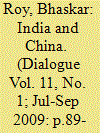

|
|
|
|
|
| Publication |
2009.
|
| Summary/Abstract |
When Chinese leaders talk of 2000 years of happy relations between China and India, they do so to circumvent some prickly questions. The theory, in reality, is misleading. A few Buddhist monks travelled to Tibet and China to spread their philosophy.
|
|
|
|
|
|
|
|
|
|
|
|
|
|
|
|
| 18 |
ID:
123444
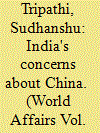

|
|
|
|
|
| Publication |
2013.
|
| Summary/Abstract |
According to Sudhanshu Tripathi the suspected imperialistic-military ambitions and consequent assertion of China as a global player, through its rapidly modernising armed forces and fast expanding economy, need to be contained by the international community to preserve the peace, prosperity and security of the world.
|
|
|
|
|
|
|
|
|
|
|
|
|
|
|
|
| 19 |
ID:
111889
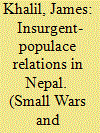

|
|
|
|
|
| Publication |
2012.
|
| Summary/Abstract |
The first objective of this article is to provide conceptual clarity regarding the term 'support' in the context of insurgent campaigns. While it is commonly claimed that insurgent and counterinsurgent forces compete for the support of the populace, there is often ambiguity as to whether this refers to a voluntary preference for a group of armed actors (attitudinal support), or a set of actions that provide direct benefits to one of these groups (behavioural support or collaboration). Furthermore, while a number of academics and practitioners focus upon the former on the assumption that it translates into the latter with sufficient consistency (Lawrence 'of Arabia', Mao, etc.), others maintain a contradictory stance (Kilcullen, Kalyvas, etc.). The findings from research undertaken into the 1996-2006 conflict in Nepal suggest a more complex reality in that certain forms of collaboration (e.g. provisions of information) seemingly necessitate supportive attitudes to a greater extent than others (e.g. supplies of food). The second objective is to evaluate the various approaches used by the Maoist insurgents to generate these distinct forms of support. While their ideology largely failed to resonate with the populace, attitudinal support was obtained through various 'popular appeals', including land reform, an opposition to an increasingly repressive monarchy, and campaigns to empower certain marginalised sectors of society. In contrast, the development initiatives of the Maoists, and their nationalist rhetoric in opposition to US and Indian influence were substantially less effective. Each of these initiatives were undertaken to obtain collaboration via attitudinal support, but the former was also generated directly through the use of coercion against specific non-combatants.
|
|
|
|
|
|
|
|
|
|
|
|
|
|
|
|
| 20 |
ID:
122312


|
|
|
|
|
| Publication |
2013.
|
| Summary/Abstract |
The Rectification Campaign of 1957 prompted a vibrant debate about Chinese socialism. This debate contained three analytically distinct perspectives on the intellectual, each corresponding to a specific vision of socialist development. The "legislator" perspective, championed by college students, demanded for intellectuals the right to help to define socialism. Leading intellectuals sponsored the "reformer" view, which argued that intellectuals were vital to improving governance under the Chinese Communist Party. The state's "red-and-expert" ideal demanded intellectuals' devotion to the working class and the acceleration of professional training for members of the working class. These perspectives promoted, respectively, a modernist, a traditionalist and a borderline Gramscian path of development-none of which was embraced by the Mao regime or post-Mao leaderships. Recovering these visions enriches our understanding of Chinese socialism; they offer powerful contrasts to extremes of both a subsequent Maoism and the current widening inequalities, official corruption and abuses.
|
|
|
|
|
|
|
|
|
|
|
|
|
|
|
|
|
|
|
|
|